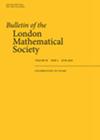将有限表示的自相似群嵌入有限表示的简单群
IF 0.8
3区 数学
Q2 MATHEMATICS
引用次数: 0
摘要
证明了每一个有限表示的自相似群都嵌入在一个有限表示的简单群中。这证明了嵌入在有限表示的自相似群中的每一个群都满足Boone-Higman猜想。所讨论的简单群是Röver-Nekrashevych群的某些换向子群,困难在于,即使一个Röver-Nekrashevych群是有限呈现的,它的换向子群也可能不是。我们还讨论了一个关于环上矩阵群的一般例子,特别证明了GL n(Q)$ \operatorname{GL}_n(\mathbb {Q})$的每一个有限生成的子群都满足Boone-Higman猜想。本文章由计算机程序翻译,如有差异,请以英文原文为准。
Embedding finitely presented self-similar groups into finitely presented simple groups
We prove that every finitely presented self-similar group embeds in a finitely presented simple group. This establishes that every group embedding in a finitely presented self-similar group satisfies the Boone–Higman conjecture. The simple groups in question are certain commutator subgroups of Röver–Nekrashevych groups, and the difficulty lies in the fact that even if a Röver–Nekrashevych group is finitely presented, its commutator subgroup might not be. We also discuss a general example involving matrix groups over certain rings, which in particular establishes that every finitely generated subgroup of satisfies the Boone–Higman conjecture.
求助全文
通过发布文献求助,成功后即可免费获取论文全文。
去求助
来源期刊
CiteScore
1.90
自引率
0.00%
发文量
198
审稿时长
4-8 weeks
期刊介绍:
Published by Oxford University Press prior to January 2017: http://blms.oxfordjournals.org/

 求助内容:
求助内容: 应助结果提醒方式:
应助结果提醒方式:


